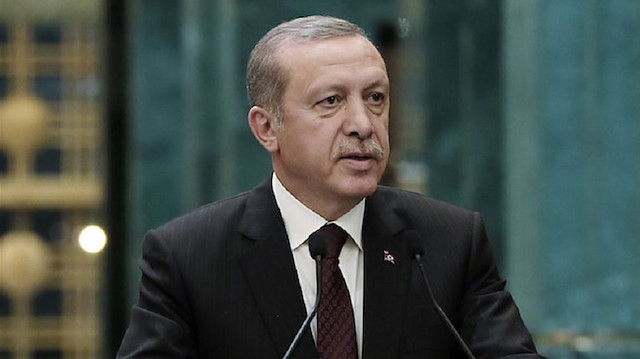
Turkey's policy on regional energy reserves revolves around fairness, but country ready to defend its rights, says President
Turkey's President Recep Tayyip Erdoğan on Saturday said the country's policy regarding hydrocarbon reserves in the Eastern Mediterranean region was based on equal share among regional countries whereas "some" sought to raise tension.
"While there is an opportunity of fair share [of hydrocarbon reserves], threat and blackmailing policies are followed. But no country is above international laws," Erdogan said, speaking at the opening ceremony for the Trans-Anatolian Natural Gas Pipeline’s (TANAP) Europe link in Turkey’s northwestern Edirne province.
Turkey would never allow anyone to violate the rights of Turkey and the Turkish Republic of Northern Cyprus (TRNC), he added.
The Turkish leader said the humankind fought bloody wars for the sake of controlling energy sources in the past two centuries, leading to global and regional instabilities and disruption of the peaceful environment across the globe.
Stressing that Ankara administration would not turn a blind eye to a fait-accompli, Erdogan said his country would not bow down to any threats.
"It is not possible to carry out projects in the region by excluding a country with long maritime boundaries in the Eastern Mediterranean," Erdogan said, referring to Turkey.
"Our two high-tech drilling vessels, Fatih and Yavuz, and two seismic research ships operate in the region.
"We will not withdraw these ships, and they will continue to operate there," he added.
The Turkish navy have protected these operational ships and their crew members, Erdogan said he believed his country's efforts would soon bear fruit.
On Thursday, the Turkish administration and UN-recognized government of Libya inked a memorandum of understanding regarding the delimitation of maritime boundaries between both countries. "Now, they have begun to threaten Libya," Erdogan said.
Noting that Turkey's drilling activities in the region would lead to peace and prosperity, not blood and conflict, Erdogan called on the other countries to have cooperation and dialogue.
"Let us turn energy into a cooperation ground, not a conflict instrument," he said, urging regional countries to follow diplomacy over destructive policies.
Hello, the comments you share on our site are a valuable resource for other users. Please respect other users and different opinions. Do not use rude, offensive, derogatory, or discriminatory language.
The floor is all yours.








